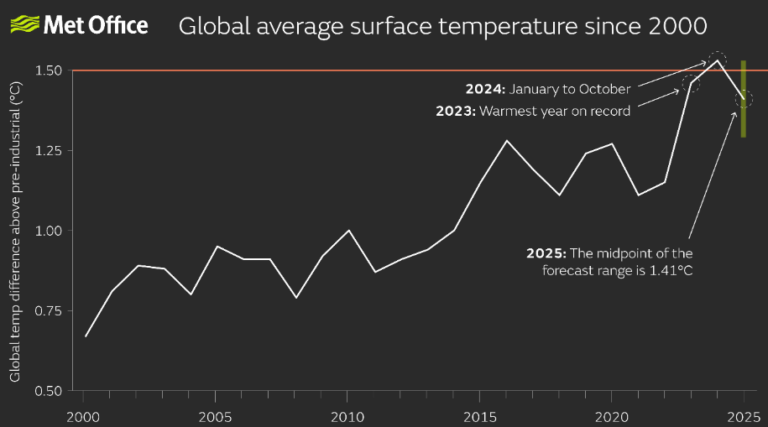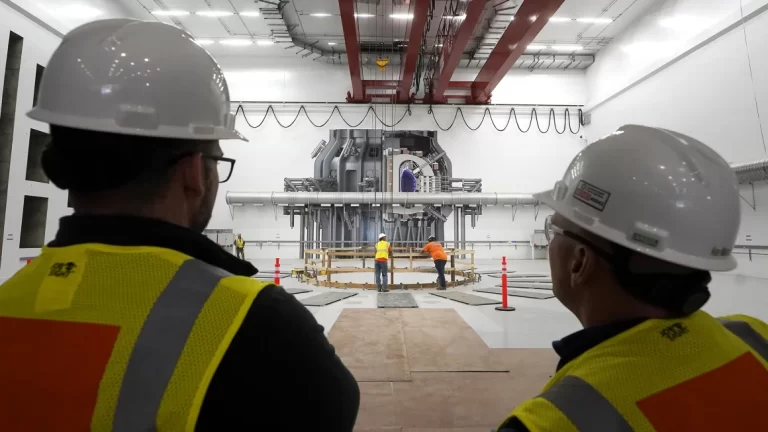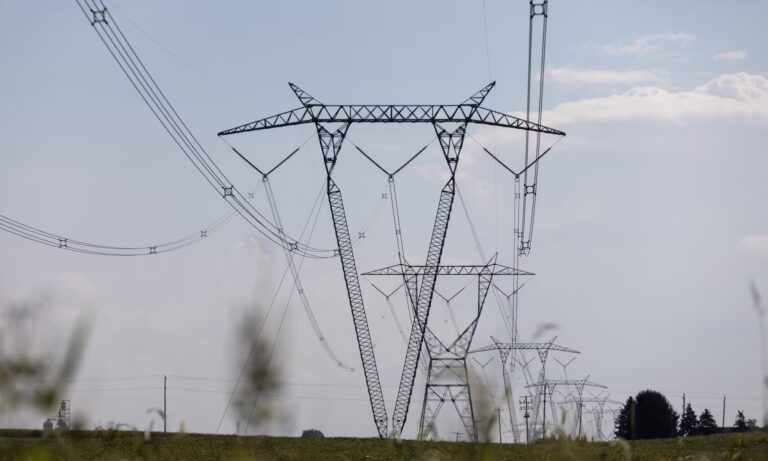
An Example: One property owner reacts to climate change
Editor’s Note: climate change changes economic incentives, which change all sorts of things. Here, a major land owner in Florida exits raising oranges and will use the land for real estate development and other uses because “we must now reluctantly adapt to changing environmental and economic realities. Our citrus production has declined 73% over the last ten years, despite significant investments in land, trees and citrus disease treatments. The impact of Hurricanes Irma in 2017, Ian in 2022 and Milton in 2024 on our trees, already weakened from years of citrus greening disease, has led Alico to conclude that growing citrus is no longer economically viable for us in Florida,” said John Kiernan, Alico’s President and CEO.”

A brief look at 2024 weather extremes; 1.5°C ceiling broken
Climate change meant that there were about 41 more “extreme heat” days in 2024, according to the World Weather Attribution’s annual extreme weather report. Climate change contributed to at least 3,700 deaths, but “it’s likely the total number of people killed in extreme weather events intensified by climate change [in 2024] is in the tens, or hundreds of thousands,” the group said. While the El Niño weather pattern contributed to global trends, climate change played a bigger role in fueling extreme weather. “As the planet warms, the influence of climate change increasingly overrides other natural phenomena affecting the weather,” the report added.

Renewal Energy Boom Remaking Nevada Landscape
In Nevada, plans are moving ahead for transmission lines, solar farms, geothermal plants and more in the name of fighting climate change. Pictured above, a solar farm near Pahrump, NV. Yet even among environmental groups and government officials, the projects are controversial.
Nevada, where the federal government manages more than 80 percent of the land, is a key theater for such development—nearly 12 million acres are eligible for it under the Biden administration’s solar plan, approximately 17 percent of the state. More than one-third of the solar and wind proposals pending before the federal Bureau of Land Management nationwide, meanwhile, are located in Nevada.

‘World’s first’ grid-scale nuclear fusion power plant to be in VA
If all goes to plan, Virginia will be the site of the world’s first grid-scale nuclear fusion power plant, able to harness this futuristic clean power and generate electricity from it by the early 2030s, according to an announcement Tuesday by the startup Commonwealth Fusion Systems.
CFS, one of the largest and most-hyped nuclear fusion companies, will make a multibillion-dollar investment into building the facility near Richmond. When operational, the plant will be able to plug into the grid and produce 400 megawatts, enough to power around 150,000 homes, said its CEO Bob Mumgaard.

Insurance and Taxes Now Cost More Than Mortgages for Many Homeowners
Soaring costs for home insurance and property taxes are busting homeowners’ budgets.
Insurers have pushed big rate increases because of losses from natural disasters and rising costs to repair homes. Surging home values in recent years, meanwhile, have lifted property taxes for many homeowners.
These ballooning expenses are rewriting the math of homeownership. In September, 32% of the average single-family mortgage payment went to property taxes and home insurance, the highest rate ever for data going back to 2014, according to Intercontinental Exchange.

New study updates the “social cost of carbon”
Editor’s Note: Here’s a post from Jonathan Marshall on Community. He’s written extensively about carbon pricing. See also his recent e-book on Carbon Pricing.
A new paper by three distinguished European economists offers a simple and intuitive method for estimating the “social cost of carbon” (see this thread) in place of more complex and challenging mathematical approaches.
Cutting to the chase, they derive estimates of the social cost of carbon that start around $182 per ton of carbon dioxide today, rising to nearly $600 per ton in 2050.

Youth Climate Activists Get Major Win in Montana Supreme Court
The Montana Supreme Court on Wednesday upheld a landmark victory for youth climate activists, affirming a decision by a lower court last year that the state’s energy policies violated their constitutional rights to a clean environment.
Many of the 16 young people who brought the case, Held v. Montana, testified during the trial about the extreme weather they had witnessed in their home state, which is a major player in oil, gas and coal. They argued that a state law barring consideration of climate in setting energy policy was unconstitutional.

Progress Report: Some Good News
Here are some items reported by Heatmap News as the year wraps up:
- Permian Basin methane emissions drop 26% in 2023 as new EPA rules hit.
- Biden approves 11th large-scale offshore wind project near Nantucket; construction to start in 2025.
- A large coal plant in Texas is being converted into a solar and battery power facility, financed by a federal grant.
- A surprising finding about the eco-friendliness of real vs. fake Christmas trees!

What’s with the US Electricity System in 2024
We don’t often think of the US electricity system in this aggregated and integrated way, but it’s worth doing so. To wrap these figures all together: almost 600,000 people [who work in the industry] invest $200 billion a year [of capital investments], receive $500 billion in revenue [i.e., what people pay for electricity], and operate a $2 trillion machine [the value of the infrastructure, aka “The Grid” and all the generation plants] that provides the essential energy input of our built environment, our technology system, and increasingly, our transportation and industry systems as well.
Here is a concise overview of trends and current status.
